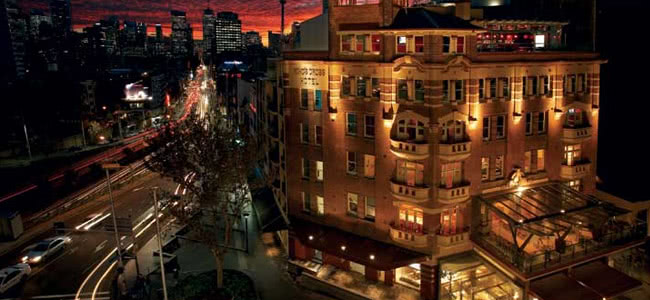If you’re one of the Sydney-siders who was perturbed by police with sniffer dogs that gate crashed Tex Perkins & The Dark Horses’ recent gig at The Factory, you might have to start getting used it. According to police reports, the second in a series of high-profile crackdowns across the Sydney CBD’s entertainment districts was considered a success by the authorities.
As The Shout reports, Operation Rushmore II saw more than 150 police teaming with agencies such as Fire and Rescue NSW, Office of Liquor Gaming and Racing (OLGR), and Family and Community Services, in a weekend-long crackdown focused on precincts such as Kings Cross, Oxford St, the George St cinema strip and The Rocks.
Officers inspected licensed premises and venues, including music nightspots, as well as patrolling surrounding streets, as well as breath-testing more than 2,500 people. Authorities accumulated 33 arrests and charged 23 people. Operation Rushmore II followed on from the first police sweep held in September 2011 that achieved similar results with 35 arrests and 34 charged.
The Commander of the Operation, Superintendent Sue Waites deemed the crackdown a success, adding that: “We will continue to run operations in these entertainment areas over the summer period.”
The Superintendent added that the increased police presence was about security, “members of the public should be able to enjoy a night out without being injured or becoming a victim of crime.”
Doug Brand, CEO of Kings Cross Liquor Accord – who has spearheaded a campaign that opposed the recent changes in liquor regulations that venue owners say cost them over $1 million a month in lost revenue – welcomed the crackdown, telling The Shout: “There was a massive police presence in Kings Cross over the weekend, and we have said all along the area needs high-visibility policing.”
Brand has previously urged for a zero-tolerance approach to violence and more late-night transport options in the popular district, following stricter regulations for music and licensed venues in the area.
“It has obviously had a very positive effect, and linked with new transport options, we are seeing much-improved results for late-night patrons,” said Brand. “We endorse the continuation of a high-visibility police presence at all times, which will go a long way to reducing alcohol-related violence.”
It’s an issue that’s plagued Sydney’s CBD, and Kings Cross in particular, since the death of 18-year-old Thomas Kelly in a senseless attack in the entertainment precinct kick-started a political and social firestorm that was the catalyst for the state of cultural flux that the city and its music scene are currently experiencing.
It started a fire under NSW Government, with Premier Barry O’Farrell introducing a raft of new measures to crackdown on licensed venues in Sydney in an attempt to curb alcohol related-violence, including more police patrols with sniffer dogs (such as those that interrupted Tex Perkins’ gig), and the tightening of liquor licensing laws in Kings Cross, such as the introduction of plastic glasses after midnight, a mandatory alcohol-free hour before a venue’s close and mandatory ID scanning.
It’s definitely been a tale of two cities however, with Lord Mayor Clover Moore and the local City Of Sydney council attempting to curb the issues of alcohol-related violence and the city’s flagging cultural scene with a new policy called Open Sydney, which is proposing nearly 300 new initiatives that aim to double the late-night economy’s annual turnover to $30 billion and increase after-hours jobs by 25 per cent by 2030.
In contrast to the government’s hard-line tactics, the first major initiative is not a tightening of an authoritative grip, but instead the launch of the recently announced inaugural Kings Cross Festival. The arts and culture event will light up the popular – but lately troubled – night-time district over five days and five nights with a series of gigs, bands, cabaret, art walks, family events, and screenings across multiple venues.
The news of plans to continue a high-visibility police presence in the CBD arrives just after Premier Barry O’Farrell’s announcement that he plans to introduce ‘drunk tanks’ to the area, with police officials already criticising the sobering up facilities as a waste of police resources and expenses.
Scott Weber, president of the Police Association of NSW, called the proposal “a Band-Aid solution,” saying that “putting a large group of intoxicated people in one location is absolutely ridiculous and a huge drain on valuable police resources.”

































